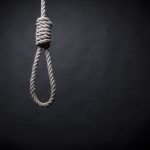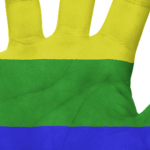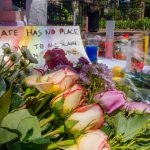Death by Stoning for Sodomy, Adultery and Rape in Brunei

As of today, a new law comes into force in the Southeast Asian sultanate of Brunei, which prescribes the penalty of death by public stoning for partaking in sexual acts with another person of the same sex.
The barbaric new law is part of a suite of Islamic corporal punishments – or Hudud – first passed into law as part of the Syariah Penal Code Order in 2013. Their implementation was delayed in part due to international condemnation around the inhumanity of the laws.
Gay sex falls under the crime of zina – or unlawful sexual intercourse – which also includes adultery. An adult Muslim found guilty of these acts can either be subjected to a lethal stoning or a public flogging.
A notice that these laws would take effect on 3 April was quietly posted on the Brunei attorney general’s website on 29 December. While the PM’s office explained on its website last Saturday that the nation has a dual legal system: one based on Sharia law and the other on Common law.
The prime minister of Brunei is also the sultan, 72-year-old Hassanal Bolkiah, who has held power for 52 years and is one of the wealthiest people in the world. His small oil-rich nation of just over 400,000 people situated on the island of Borneo only gained independence from Britain in 1984.
The autocrat’s will
Melbourne University Law Professor Tim Lindsey explained that Islamic, or Sharia, Law has applied in Brunei since the time of British colonial rule. However, the difference is “the harsh corporal punishments known as Hudud” weren’t a part of the local law until now.
“The legitimacy of the monarchy is tied directly to its Islamic qualities,” said Professor Lindsey. “And the sultan has always pushed very hard to increase the range of Islamic laws that apply, and the severity of penalties, as a sign of his religiosity.”
Along with the death penalty for sodomy, adultery and rape, the new laws include the punishment of flogging for abortion, as well as amputation for theft. A first time thief will have their right hand cut off. And for or a second offence, a thief will have their left foot removed.
“These new laws are not popular demands or what conservative Islamist groups are pushing for,” the professor told Sydney Criminal Lawyers. “They’re from the top down. The sultan has called for them consistently for decades.”
Regulated capital punishment
According to Professor Lindsey, this “extreme version of the criminal law” was adopted in 2013, but implemented in three stages. In 2014, punishments for minor offences began, with the second stage for medium offences commencing a year later. And now punishments for serious offences will apply.
“They couldn’t initially apply the stoning or amputation, because they needed procedural regulations to do it,” the Malcolm Smith chair of Asian Law continued, adding that these procedures were passed last year, which paved the way for the physical punishment regime to commence.
However, a spokesperson for the Brunei Religious Affairs Ministry said last week that, “In terms of readiness, at the moment, we are prepared to enforce the amputation of the hand for stealing only.” And the sultan will announce when the other punishments will take effect on Wednesday.
Extreme bigotry
“Homosexuality is already illegal in Brunei. It’s punished with a gaol sentence,” Professor Lindsey continued. “Brunei has the death sentence on its books, but hasn’t applied it. And it remains to be seen in what circumstances that they will actually sentence homosexual people to death.”
Brunei joins nine other countries around the world where the death penalty applies for homosexuality. These include Saudi Arabia, Iran, Sudan, Nigeria, Yemen, Somalia, Qatar, Afghanistan and Mauritania.
In October 2017, the UN Human Rights Council passed a resolution condemning the use of the death penalty to punish consensual gay relations. Twenty seven nations voted in favour of the motion, seven abstained, while thirteen voted against it.
And much to the shock of onlookers, the US was one of the countries that voted against the resolution. The Trump administration asserted it voted in that manner as it did not want to more broadly condemn capital punishment. However, the fact it didn’t simply abstain didn’t go unnoticed.
While in January this year, authorities in the Russian republic of Chechnya launched a new crackdown on gay people. They rounded up and detained 40 individuals, two of whom died whilst being held in custody.
This follows on reports from 2017 that involved the mass detention of 100 gay people, who were subjected to torture at the hands of authorities. And some of these victims also died at the time of what became known as the gay purges.
Regional conservatism
Brunei shares the island of Borneo with two other nations. It’s completely surrounded by the Malaysian state of Sarawak, and to north of that is Sabah, another state of Malaysia. And the south of the island is taken up by the Indonesian province of Kalimantan.
All three countries are Muslim, but it’s only Brunei that’s taken on more extreme Islamic laws as part of its political system. Professor Lindsey explained that the region is no hotbed of extremism, although local “Muslim attitudes have become more conservative” over the last three decades.
“We’ve seen that in an increasing range of moral laws that have been introduced,” the professor went on. “Homosexuality is legal in Indonesia, which is the world’s biggest Muslim society. But, one of its provinces Aceh has made it illegal.”
A law unto itself
Amnesty International condemned Brunei’s new system of stoning people for partaking in same-sex acts, as well as amputation for theft, as “vicious”. And it called on the nation to “immediately halt its plans” and bring its laws into “compliance with its human rights obligations”.
As far as Professor Lindsey is concerned, there’s not a lot the international community can do. He outlined that while outside pressure did delay the implementation of these extreme laws, there’s no real mechanisms available to international entities to put pressure on to revoke them.
“Brunei is an extraordinarily wealthy place. It’s not dependent in anyway on foreign aid, like a lot of other countries are. And it doesn’t sign up to many international human rights conventions,” the professor concluded. “There’s not a lot of leverage.”







